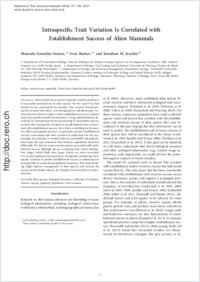Intraspecific trait variation is correlated with establishment success of alien mammals
- González-Suárez, Manuela Department of Conservation Biology, Estación Biológica de Doñana–Consejo Superior de Investigaciones Científicas, Sevilla, Spain
- Bacher, Sven Department of Biology, Unit Ecology and Evolution, University of Fribourg, Switzerland
- Jeschke, Jonathan M. Department of Ecology and Ecosystem Management, Restoration Ecology, Technische Universität München, Freising-Weihenstephan, Germany - Leibniz-Institute of Freshwater Ecology and Inland Fisheries (IGB), Berlin, Germany - Department of Biology, Chemistry, Pharmacy, Institute of Biology, Freie Universität Berlin, Berlin, Germany
-
01.06.2015
Published in:
- The American Naturalist. - 2015, vol. 185, no. 6, p. 737–746
English
Many studies have aimed to identify common predictors of successful introductions of alien species, but the search has had limited success, particularly for animals. Past research focused primarily on mean trait values, even though genetic and phenotypic variation has been shown to play a role in establishment success in plants and some animals (mostly invertebrates). Using a global database describing 511 introduction events representing 97 mammalian species, we show that intraspecific variation in morphological traits is associated with establishment success, even when controlling for the positive effect of propagule pressure. In particular, greater establishment success is associated with more variation in adult body size but, surprisingly, less variation in neonate body size, potentially reflecting distinct trade-offs and constraints that influence population dynamics differently. We find no mean trait descriptors associated with establishment success, although species occupying wider native distribution ranges (which likely have larger niches) are more successful. Our results emphasize the importance of explicitly considering intraspecific variation to predict establishment success in animal species and generally to understand population dynamics. This understanding might improve management of alien species and increase the success of intentional releases, for example, for biocontrol or reintroductions.
- Faculty
- Faculté des sciences et de médecine
- Department
- Département de Biologie
- Language
-
- English
- Classification
- Biological sciences
- License
- License undefined
- Identifiers
-
- RERO DOC 257045
- DOI 10.1086/681105
- Persistent URL
- https://folia.unifr.ch/unifr/documents/304527
Statistics
Document views: 57
File downloads:
- bac_itv.pdf: 156
